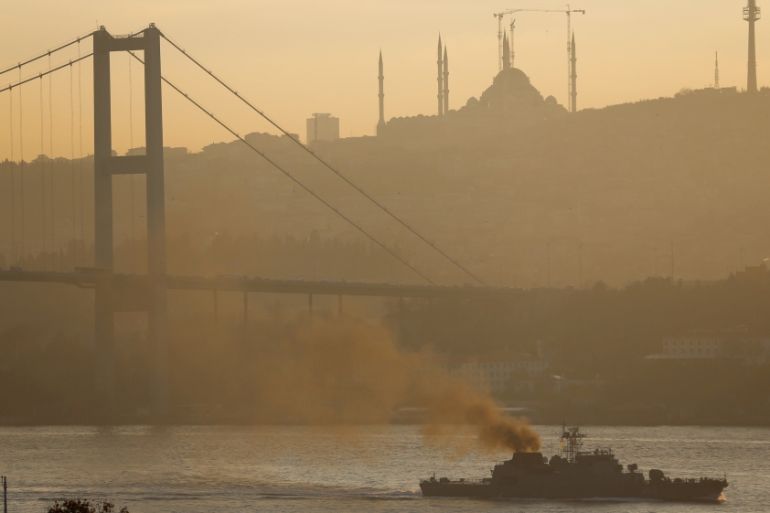Turkey’s Canal Istanbul dispute explained
Controversy in Turkey over mega waterway project and key international treaty leads to arrest of retired admirals.

Criticism by dozens of retired Turkish admirals and diplomats warning the government not to open up for debate a key international treaty managing Turkey’s major waterways has created new controversy.
The Turkish government last month approved President Recep Tayyip Erdogan’s plans to build a shipping canal in Istanbul similar to the Panama or Suez canals as an alternative to Turkey’s internationally used straits connecting Asia to Europe.
Keep reading
list of 4 itemsTurkey condemns warning by retired admirals over Bosphorus treaty
Erdogan says Turkey wants region to become ‘island of peace’
Greece accuses Turkey of trying to provoke it with migrant boats
The 45km (90-mile) Canal Istanbul is projected to cost $9.2bn.
What is Montreux?
However, critics of the project say it opens up the key Montreux Convention signed in 1936 for discussion.
The Montreux Convention regulates the use of the Bosphorus and Dardanelles straits – which link the Black Sea to the Mediterranean Sea – for cargo ships from other countries.
The treaty also grants Turkey rule over the waterways and peacetime guarantees for access for civilian vessels.
According to the text, the passages of war vessels through the straits are subject to restrictions that vary depending on whether they belong to countries with coasts along the Black Sea or not.
Erdogan said in January the Montreux Convention would only apply to the Bosphorus and Dardanelles straits in terms of maritime traffic, not the planned canal.
“Do no worry about that. Montreux only binds the straits. This is totally outside Montreux.”
Who are the critics?
More than 120 retired Turkish ambassadors released a statement on Friday warning the project could put the Montreux Convention in jeopardy and negatively affect Turkey’s “absolute sovereignty” over the waterways.
Following that up, an open letter was signed by 104 retired admirals and published overnight on Saturday, causing an uproar among government officials who said it harkened back to coup times of Turkey’s past.

Admirals said the treaty allowed Turkey to maintain its neutrality during World War II, calling it “the biggest diplomatic victory that completed the Lausanne Peace Treaty”, which determined most of modern Turkey’s borders.
“We are of the opinion that there is a need to avoid any statements and actions that could cause the Montreux Convention, an important treaty in terms of Turkey’s survival, to be brought up for discussion,” the statement said.
Turkey’s opposition parties have also expressed similar criticism of the project in previous months.
Investigation and detentions
In addition to the harsh public reaction by officials, who said they viewed the admirals’ letter as an attempt to intervene in civilian politics, Turkish prosecutors opened an investigation.
Ten retired admirals who signed the open letter were detained. Four other suspects were ordered to report within three days to Ankara police, which opted not to detain them because of their age.
The former senior military leaders are reportedly accused of “using force and violence to get rid of the constitutional order”.
Past coups
The Turkish military staged three coups between 1960 and 1980 and another recent attempt in 2016.
The failed overthrow of Erdogan by a group in the military in 2016 was blamed on followers of United States-based Muslim preacher and businessman Fethullah Gulen.
The government has accused Gulen’s backers of forming a “parallel state” following its own agenda inside state institutions, including the police, judiciary and military.
Following the failed coup, tens of thousands of people were held pending trial and civil servants, military personnel and others were jailed, sacked or suspended. More than 20,000 people have been expelled from the Turkish military.
Turkey’s Western allies and rights groups have condemned the government over the crackdowns, purges and weakening of judicial independence after the 2016 putsch, accusing the government of using it as a pretext to silence opposition.
Ankara says the country upholds the rule of law and necessary moves are taken with the aim to remove Gulen’s supporters from state institutions.